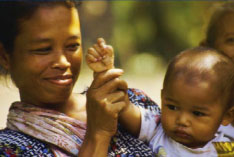Women and AIDS
Prevention of Mother-to-Child HIV Transmission
 |
| Source: Andrew Curtin |
One of the tragic consequences of HIV infection in women is the transmission of the virus to their children, which can occur during pregnancy, at the time of delivery, or through breastfeeding. Worldwide the effects of mother-to-child transmission (MTCT) of HIV are staggering, with more than 2 million children currently infected and almost 2,000 new infant infections occurring every day.
The U.S. Agency for International Development (USAID) seeks to strengthen health systems and communities to deliver prevention of mother-to-child HIV transmission (PMTCT) services to women through support for a wide variety of complementary interventions. These interventions include improvement of antenatal services, voluntary HIV counseling and testing for pregnant women, administration of antiretroviral drug prophylaxis for HIV-positive pregnant women, and support for safer infant feeding practices. USAID programs also provide multiple types of other psychosocial, clinical, and nutritional support to women who are identified as HIV-positive in the course of PMTCT programs.
|
MTCT Plus
While most PMTCT programs have focused on providing antiretroviral prophylaxis to prevent transmission of HIV to infants, it is also important to recognize that women who are diagnosed with HIV through antenatal screening have a wide variety of other needs related to their HIV-positive status. Their children and other family members also need support, as many partners are HIV-positive or at risk of infection, and even uninfected children are at a high risk of mortality due to their mother’s illness.
In response, USAID is supporting the MTCT Plus Initiative, which provides a multidisciplinary range of family-centered care and treatment services to women who are identified as HIV-positive in antenatal settings. As part of the MTCT Plus programs, 2,868 women at 12 sites in Thailand and Africa, and 764 adults and 1,908 children in their households, have been identified as eligible for care and/or treatment. Currently, 1,013 adults (28 percent) and 129 children (7 percent) receive lifesaving combination antiretroviral therapy, which also provides the additional benefit to pregnant women of further reducing MTCT when compared to short-course regimens for MTCT prophylaxis.
Although most women identified through MTCT Plus do not yet require antiretroviral therapy, these women may access other services through the program, including psychosocial support, family planning, and regular monitoring of their CD4 count to determine subsequent need for antiretroviral therapy. Through its family-centered approach, MTCT Plus also encourages involvement of male partners and thereby can help provide additional support to women living with HIV/AIDS.
Nutritional Support and PMTCT
Improving the nutritional status of women living with HIV/AIDS also plays a critical role in preventing mother-to-child transmission, as maternal malnutrition and unsafe infant feeding practices both increase the risk of infant infections and child mortality. USAID promotes safer infant feeding practices in many countries throughout the world, including Zambia, where the Linkages project is working at 47 different sites to educate HIV-positive mothers about infant feeding. USAID is also working with Linkages in Zambia, Ethiopia, Haiti, and Malawi to help improve the nutritional status of HIV-positive pregnant women by educating them about affordable ways they can increase their food intake and variety.
Increasing Access for Women to PMTCT Services
While substantial progress has been made in reaching women who need PMTCT services, most pregnant women with HIV in Africa still do not have access to them. USAID is working with a range of partners to continue to rapidly expand outreach. One project reached more than 220,000 women in 11 countries with PMTCT services from July 2003 to June 2004, providing antiretroviral prophylaxis to more than 22,000 of them. There are plans to increase the number of women benefiting from this project in 2005.
In many areas, the uptake of PMTCT services by women has been low due to a variety of barriers women face in accessing these services, including lack of community support, psychosocial barriers related to HIV stigma, and geographical isolation for women living in rural areas. To help women overcome these barriers, USAID has been supporting efforts to involve communities in promoting PMTCT services. In the UMOYO project in Malawi, a network of nongovernmental organizations that have been cooperating with one another and with the Ministry of Health has helped develop facility- and community-based support systems that will increase women’s use of HIV testing and PMTCT services. In Nairobi, Kenya, USAID is supporting practical research examining several different innovative approaches to increase women’s access to and use of PMTCT services, including establishing temporary clinics nearer their homes, training HIV-positive women to give psychosocial support, and providing PMTCT services through traditional birth attendants.
To increase access for women living in rural areas, USAID is researching methods of packaging and delivering a single infant dose of the antiretroviral drug nevirapine so that women who deliver at home can provide this to their newborn babies and thereby help prevent them from becoming infected with HIV.
April 2005
Download a Print-Friendly Version of this Issue Brief [PDF, 412KB]
|


